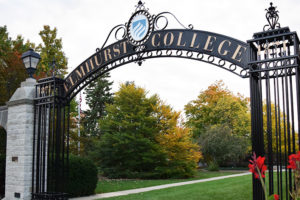
Revolution has taken place in Tunisia, Egypt and Libya. Protesters have taken to the streets in Algeria, Iraq and Jordan. Syria has experienced a violent uprising.
Is this “Arab Spring” an unprecedented movement led by a new generation of youth demanding political, cultural and religious freedom? Or is it the latest cycle of upheaval that has characterized the volatile Middle East for centuries?
This was the focus of debate during “The Arab Spring: Perspectives from the Ground,” a panel discussion by journalists and scholars who offered eyewitness accounts and historical perspective about the political and social changes taking place in the Mideast.
The discussion, held March 27 in the Founders Lounge, was sponsored by the Pulitzer Center on Crisis Reporting and the Elmhurst College departments of religious studies and English.
Panelists included Ellen Knickmeyer, Saudi correspondent for The Wall Street Journal/Dow Jones; William Wheeler, who has reported on Libya for the Pulitzer Center; Ghada Hashem Talhami, D.K. Pearsons Professor of Politics, Emerita, at Lake Forest College; and Laith Al-Saud, an instructor of Islamic world studies at DePaul University.
“There was a diversity of perspectives,” said moderator Inam Haq, adjunct professor of religious studies, program coordinator for the Niebuhr Center and the Muslim co-chaplain. “The journalists provided immediate context and the scholars provided historical context. It brought out many points of view.”
For the journalists who have covered the recent turmoil in the Middle East, Arab Spring is a new phenomenon led by young people and fueled by the Internet and social media.
“In Libya, I met people who complained about the lack of opportunities, the lack of education, who saw a better life on the Internet,” Wheeler said. “I saw rebels in Sirte fighting house to house. And a few of them had green spray paint canisters in their back pockets. And as soon as they took a section of the city, they’d tag it up with, ‘Game Over, Gaddafi.’ It was the slogan of a young generation that listened to American rap music and played video games.”
Knickmeyer, who previously had reported in Baghdad and Cairo, returned last year to Tunisia, Egypt and Libya, and saw a noticeable change in the Arab people, especially among the youth.
“Young people for the first time knew what freedom was. They had the freedom for the first time to go out on the street and protest,” Knickmeyer said. “It was such a change in the Arab people. People who had been so apathetic were so engaged in their own lives. They were tasting freedom for the first time.”
But for scholars like Talhami, who has written six books on Egyptian politics, the press and the rights of Muslim women, this latest movement is part of a centuries-old ebb and flow of politics, culture and society in the Middle East.
“When the American media began calling it the ‘Arab Spring,’ we were all scratching our heads. I think it shows an utter lack of understanding of what the Arab world is all about,” Talhami said.
Throughout history, the Middle East has seen the rise and fall of dictators, the gain and loss of rights and power by women, and the uprising of Arab youth, Talhami said.
“Let’s not assume the Middle East is frozen in stone,” Talhami said. “It goes up and it goes down.”
While events over the past 18 months in the Middle East suggest a new birth of freedom and democracy, the scholars voiced caution and the need to take a longer view.
“Arabs always see themselves in terms of centuries. They’re keenly aware of their own history,” Al-Saud said. “It’s a recurring theme.”
While there was disagreement over the short- and long-term significance of the Arab Spring, the panelists all believed that the next few years will dictate the future direction the Middle East takes toward democracy, women’s rights and other social issues.
“I don’t think there’s any going back. But the question is, where is it going in the future?” Wheeler said.
Talhami believes that Middle Eastern youth will determine whether the region progresses politically in a peaceful or violent fashion.
“This is 21st century youth power. But it needs to be organized,” Talhami said. “What the youth need to learn is how to play the political game. How do you take this to the second step?”
The open, frank dialogue of the panel discussion brought out new insights into the Arab Spring movements, Haq said.
“Elmhurst College has a vibrant intellectual life, and our diverse student population responds to various points of view,” he said. “I feel that an event like this enlightens our community.”